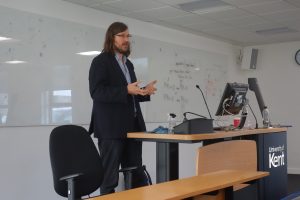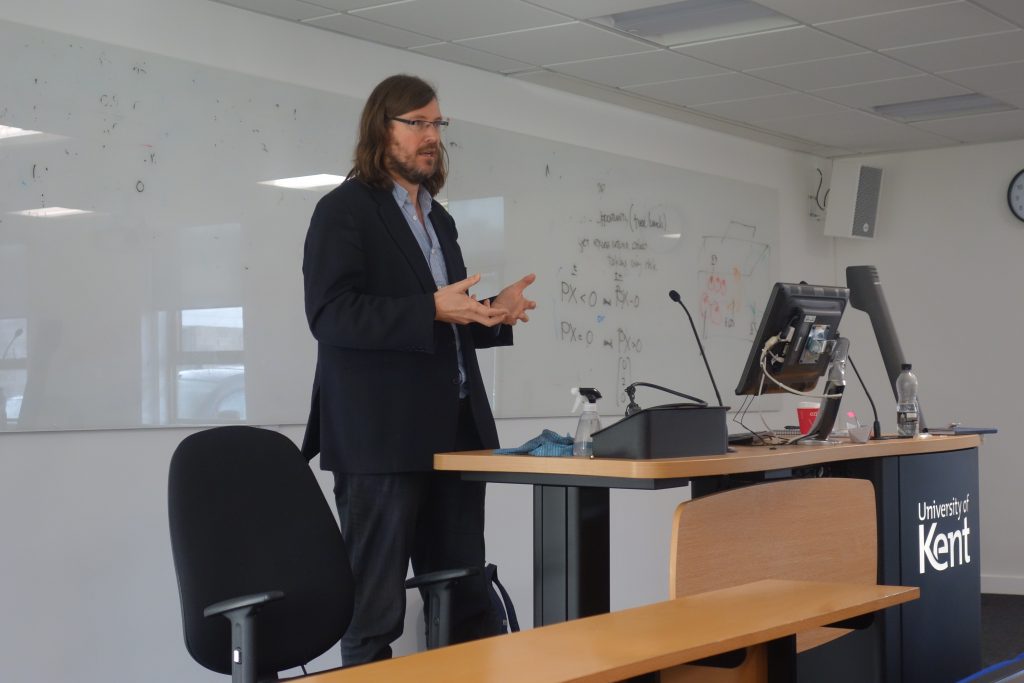‘The International Criminal Court (ICC) is in trouble’.
states Dr. Phil Clark, Reader in Comparative and International Politics and Co-Director of the Centre on Conflict, Rights and Justice at the School of Oriental and African Studies (SOAS), University of London. This powerful statement, based on the core arguments presented in his new book entitled ‘Distant Justice: the impact of the International Criminal Court on African Politics’, points to the fact that the ICC is failing on its own terms by producing important political problems at the national and the community level.  Interestingly, the vast majority of cases opened by the ICC are situated within the African context.
Interestingly, the vast majority of cases opened by the ICC are situated within the African context.
Dr. Clark was invited to present his new book and elaborate on the criticisms faced by the ICC at a lecture series organised by the Conflict Analysis Research Centre (CARC) at the School of Politics and International Relations at the University of Kent. Prior to delivering the lecture, he spoke to CARC and provided some insightful thoughts options for reform within the ICC and whether or not the institution has had some if any success in dealing with African conflict cases – and in light of the backlash faced by states threatening to withdraw from the Rome Statute. Although his book was centred around two primary cases, the Democratic Republic of Congo and Uganda, the book includes evidence of other cases across Africa.
Legitimate or illegitimate?
A significant criticism faced by the ICC encompasses the idea of legitimacy. ‘The threat by Burundi and other African states [to leave the ICC] posed a legitimate problem to the court but they [the court] refuted this by saying they are, indeed legitimate because of the number of states signed up to it’, explained Dr. Clark. The ICC has mostly seen off this threat despite other countries hinting that they would follow in Burundi’s footsteps, a move that was made possible in light of the ICC pushing for a government investigation in the country. However, Dr. Clark explained that it is too soon to conclude by saying that the threat of withdrawal from African states from the Rome Statute has been completely eliminated and it could gain momentum, once again, in the future. Moreover, the ICC controls cases from its headquarters in The Hague and does not, interestingly enough, have officials stationed in the country being investigated meaning that, oftentimes, the court misjudge the real political situation. This statement is particularly relevant to the ICC’s intervention in the Democratic Republic of Congo and Uganda.
In both cases the ICC undermined the severity of the political situation in destabilised states. ‘The ICC got involved by actively chasing the cases and were on the front foot looking for ways to get involved’, explained Dr. Clark. It should be noted that in both states, civil war and mass human rights violations had taken a toll on government stability. The ICC did not, in fact, target government officials. Furthermore, the court was open to being manipulated by the state, something that has been noted in similar cases, explained Dr. Clark. Since the investigations by the ICC were launched, national elections have been held in both the Democratic Republic of Congo and Uganda, but they were not without violent crackdowns on civilian protestors and there was the general perception from the respective governments that they were not afraid of international prosecution as the ICC were exclusively targeting non-state actors. Despite the ICC’s evident role in destabilising the aforementioned states, were there any ‘success’ stories of ICC intervention in Africa?
Are there ‘successful’ cases?
Dr. Clark pointed out that this is dependent on how the word ‘success’ is defined but he believed that if a trial was completed then it can be considered ‘successful’. There have been some cases that were completed, but there were also significant challenges. The case of Ahmad Al Faqi Al Mahdi in Mali was a ‘quick trial’ as it only lasted one week and established the precedent of destroying cultural heritage. He was accused of other crimes as well although the prosecutor found insufficient evidence to support the accusations. Dr. Clark pointed out that trialing someone for destroying cultural heritage was unique and created a potential to open up similar cases of cultural heritage crimes. In the Democratic Republic of Congo, the trial of Thomas Lubanga, a convicted war criminal was completed but it almost collapsed on two occasions as serious questions were posed about evidence.
Options for reform?
Based on what has already been discussed, it is clear that the ICC has had more failures than successes but are there any options for reform? Dr. Clark lays out the reform agenda in his book, but he is unsure if the ICC is fully open to reform. ‘The selectivity of the African cases is a serious mistake. Africa has many problems within the jurisdiction of the ICC, but the court has taken on a neo-colonial role and rather naïve approach’. Dr. Clark also reiterated the point that the ICC must push on investigating cases from outside the African continent. The case of Russia vs. Georgia has been taken to the ICC, but no in-depth investigation has taken place yet. Dr. Clark, moreover, listed a few options for reforming the ICC including the court shrinking the distance and hiring African experts to guide ‘on the ground’ investigations and the court needing to display a greater degree of deference to domestic processes. Finally, Dr. Clark explained that the court needs to be humbler and more cautious about getting involved in Africa.
The pre-lecture discussion concluded with a few words on the role of domestic courts and if they can work in tandem with the ICC on future cases. ‘The ICC believes that African courts aren’t effective in dealing with justice. The court believes that it provides the technical expertise and leads the way and essentially shows African courts how to do the job’, says Dr. Clark. Nevertheless, there has been substantial reform at the national level to improve effectiveness and the track record dealing with cases such as genocide and crimes against humanity. In the Democratic Republic of Congo, for example, the national courts were investigating individuals that the ICC demonstrated it could not investigate, government suspects. Dr. Clark concludes: ‘We should empower the domestic courts rather than hope that the ICC will rescue those states from their terrible crimes’.
We would like to thank Dr. Phil Clark for taking time out of his busy schedule to come talk to us about a very relevant and intriguing topic.
The live-stream for the event can be found here
Interview with Dr. Phil Clark: here

